‘Your Monster’ Composer Timothy Williams on Scoring Both the Beauty and the Beast
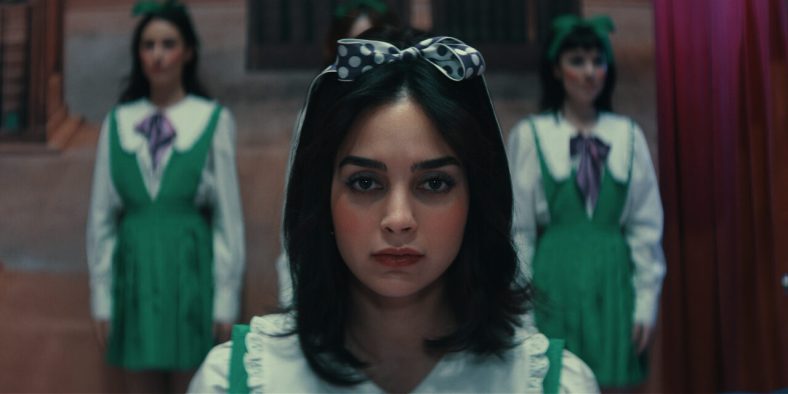
A tale as old as time, director Caroline Lindy’s Your Monster recounts the touching story of a brokenhearted young woman and the monster residing in her closet. Unfolding like a dark Disney tale for adults mixed with a modern Drop Dead Fred, Lindy blends romance, comedy, and horror into something altogether new and wonderful. A significant asset in selling this unique blend of genre elements comes courtesy of the film’s score by composer Timothy Wiliams.
A true musical maestro, Williams’ talents cover everything from composing and orchestrating to conducting, performing, producing, and more. This vast skill set and genuine passion for film music have led to a similarly vast body of work that includes credits like Pearl, Get Out!, Brightburn, IT, The Color Purple, Guardians of the Galaxy, Shudder’s Creepshow, The Swearing Jar, Founders Day, Christopher Robin and an ongoing working relationship with fellow composer Tyler Bates. Perfectly positioned to navigate Your Monster’s shifting genre tides, Williams’ score balances the film’s cheeky tone and adds a rich emotional depth to the story.
In Your Monster, Melissa Barrera delivers a powerhouse performance as talented stage actress Laura Franco. Just as her Broadway career and relationship seem on the verge of flourishing, a cancer diagnosis knocks everything off course. Soon finding herself dumped while also recovering from surgery, Laura moves back into her mom’s townhome. There, she not only finds solace in the old musicals she loves, but also discovers a literal Monster (Tommy Dewey) camped out in her closet. Soon, the two odd roommates help each other realize the power in embracing one’s inner beast, that love doesn’t have to be monstrous, and that sometimes things are definitely not ok.
Following a successful premiere at Sundance, Dread Central virtually sat down with composer Timothy Williams to learn more about his beautiful work on Your Monster.
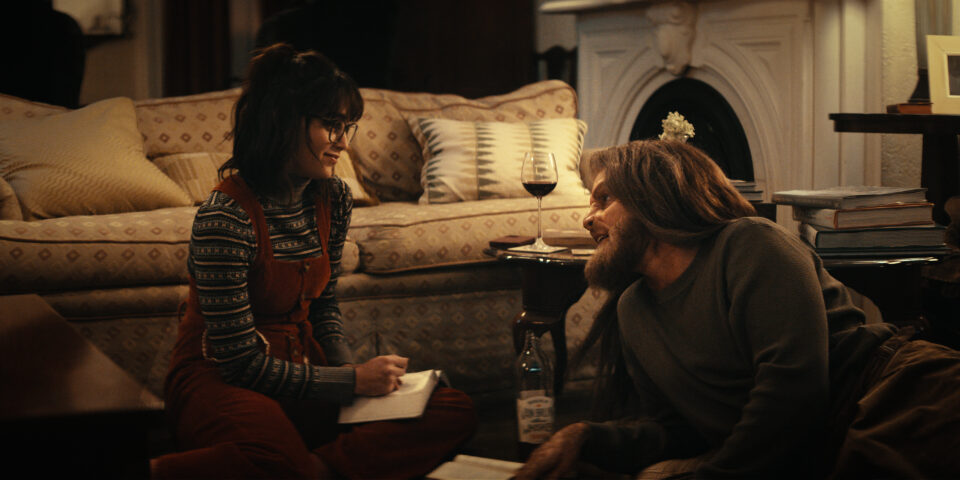
Dread Central: Congrats on the positive reception at Sundance! It was great to see Your Monster also secure distribution so quickly.
Timothy Williams: I was so thrilled to be involved with this. Caroline Lindy, the director, is an absolute genius, and it’s such a great mashup of rom-com with incredible horror elements. It also has such a powerful message about someone learning to speak up for themselves and embrace their way, embrace their discontent, and be able to try and express it rather than being the timid mouse in the corner. And Melissa Barrera is so good in it. It was such a privilege to work on this film and bring the music side of it to life.
DC: This movie feels so confident, and it feels like Lindy had a strong vision of what it would be. Did that also translate to what the film would sound like? What were your initial conversations like about the direction for the score?
TW: This was a very difficult film because it truly is a mashup of two different genres. With Brightburn, I [experienced] a little bit of that in that Brightburn was a superhero film and horror mixed together. And I think Pearl had a little bit of that, too, where it was a drama and story of someone’s transformation over time mixed with horror. But I’ve never done a rom-com mixed with horror.
So when we sat down to discuss it, one of the things that I thought instinctively early on was that we should not play the comedy. We should play the romance as though it were real. Even though you have a monster and you obviously suspend your disbelief that the love interest is the monster in the closet. My feeling was, and Carolyn totally agreed and was on board with the same direction, was to write it as though it was Shakespeare in Love. Write it as though this were just an unfolding love story, and then let the comedy bubble up over that. So we weren’t doing the traditional kind of comedic things. I just felt like it needed to be grounded in emotion.
The other colors that we discussed were because there was originally a little bit of temp. We discussed Edward Scissorhands with the choir, fantasy and celeste, that magical fantasy sound. And again, I just said, “I think that’s an area that we should avoid. This shouldn’t feel like a fantasy.” Because it’s a monster, you could play it like a fantasy, but everything inside of me was just crying out, saying, “Just score it like a romance and score the horror parts as horror.”
And then the third element of the film is the musical being put on inside of this film. You have singing and these arrangements of songs. One of the key scenes is right in the middle where they sing this beautiful Carpenters song. Monster, it turns out, is quite good at the piano, so he gets her singing. It’s really the turning point in their relationship. So we were able to do something really fun in terms of a fresh piano and string arrangement of that, too. We had fun with it. At the end of the day, it’s a film that’s meant to be fun, but it does have a very empowering storyline to it, which I think a lot of people are really loving and relating to on a personal level.
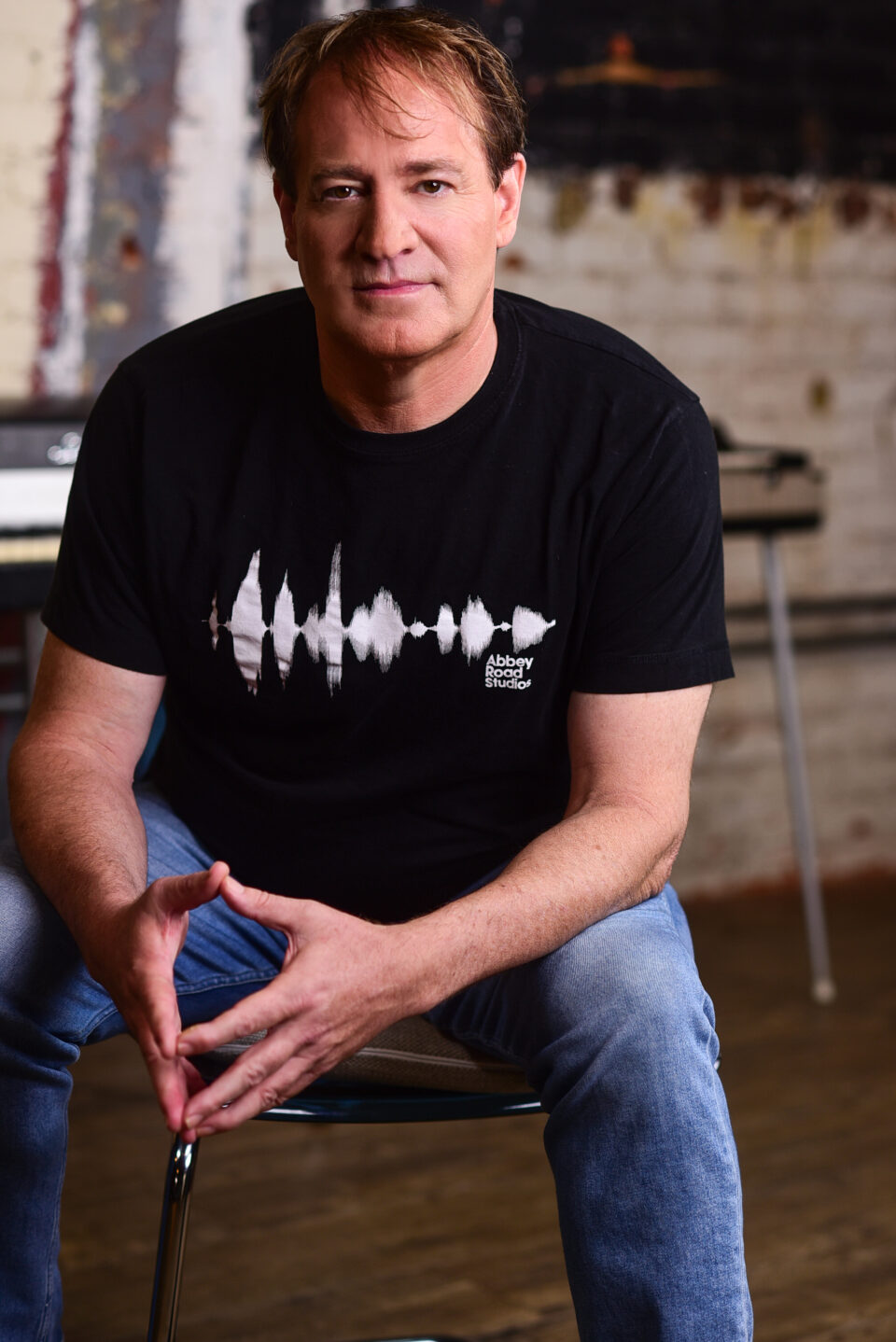
DC: The character of Laura, played by Melissa Barrera, is really the heart of this film. Can you talk a bit about Laura and how you were inspired to incorporate her character into the music?
TW: Her journey really is of someone who’s trodden down, who’s very timid and is silent or always says what she thinks is expected of her. Monster represents her inner rage as well. There’s the element of it, too, “Is he real? Is he not?” But, as the story progresses, Monster really encourages her to speak out for herself and really embrace when she’s put down to call it out and say, “No, this is not okay.”
One of the things that I had to cover was the idea of that heartbreak. The initial cue is a heartbreak cue [when she is] breaking up with her boyfriend that she’s been with for a while, who dumped her because she got cancer. Then there was the burgeoning romance with Monster, and that carried the love story forward.
But then, as you get to the back part of the film, the music shifts and it becomes deeper. There’s more turmoil in the music, particularly at the end, where she definitely finds her inner rage and her voice. It was just that sense of trying to shift that and guide that. It’s definitely tricky because the film is trying to do something that other films formulaically wouldn’t necessarily do, you know. It definitely takes a turn at the end into unexpected territory. Musically, that was part of my task. I had to make sure that the music flowed and covered all those different emotions.
DC: I loved your use of piano and guitar and how it felt very intentionally referential to classic scores of the romance genre and the musicals that Laura loves so much.
TW: That was always the intention. Caroline was very much like, “Let’s be unapologetic. Let’s make this an unapologetically romantic film.” That’s always the hardest part of scoring a film: coming up with your theme. Sometimes, it comes easy. With Pearl, it came pretty easy—that opening theme inside her head. In some of the other films I’ve worked on, the themes have been a little harder. Brightburn was very, very difficult to find a theme for and to create something that was heroic but could also be mutated into the horror side of it.
This was tricky just because we wanted to give a little bit of that retro feel in the musical language. So, we used major sevenths in the chord and minor sixths. Those chords take you back to sort of Ella Fitzgerald and that beautiful sort of classic kind of sound. But still trying to make it so that it didn’t feel straight retro. That something about it was modern, and you could listen to it now.
I think that style is really starting to come back. I’ve noticed a lot of people really embracing that style, and I am enjoying that mashup of these old standards. It’s very dated, but it’s fun to come back to it with an approach now and go, “Okay, how can we do that now, but with the older musical language?’ I breathed a huge sigh of relief when I wrote the theme and played it for Caroline, and she loved it. I was like, “Okay, the hard part of my job is somewhat done.”
DC: As the film progresses, the horror elements start to peek through more and more. How did you navigate that pretty drastic divide between romance and horror, blend the two, and still ensure that the thriller and horror elements hit appropriately hard?
TW: The film has this propulsive element with the ex-boyfriend and this Broadway musical that he thinks is going to revolutionize Broadway. That was one advantage. Of course, he is as demeaning as any theatrical director can be and what was really interesting was the levels of pressure that get put onto Laura. You can start to see this kettle beginning to bubble up and begin to boil over.
There’s an important scene where she’s really struggling, and she’s saying, “No, it’s okay. It’s okay.” And Monster says, “No. It’s not okay. It’s not okay to be treated like that.” I thought that was a very powerful scene and the music really starts to shift there. That structure of the film was very, very helpful for me musically.
There is also this point where Laura explodes at the director, and you can see that she’s had enough now and is starting to turn. So from that point on to the end of the movie, the music really starts to shift quite dark. It’s still in the rom-com mode in a weird way. It’s not quite as dramatic or heavy as I might normally do for another type of horror film. I still wanted to make it feel like it was in her world, but the anger starts to come through. So towards the end, you have those low strings kind of going, “Chhhhomp! Bonnnnkkk!” with those big drum hits that start to show her rage bubbling up. It was definitely a challenge, but that’s what makes the job fun: doing something different, trying something different, stretching the definition of what a rom-com should be.
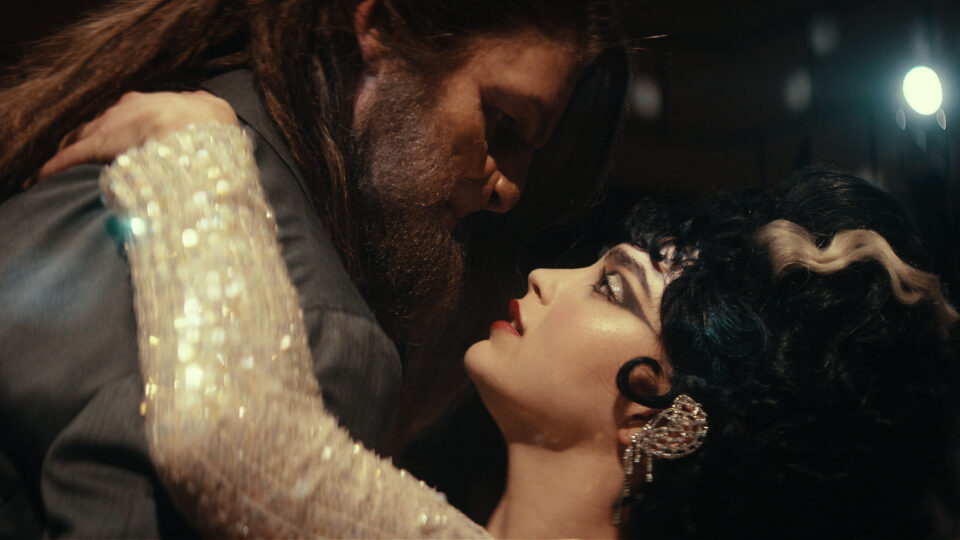
DC: We also get to hear a lot of really great insert or source songs throughout the film. Did you have any idea what was going to be used or where songs were going to be used? How did that impact your job?
TW: Yeah, there was a lot of discussion about the great source music. With source music, sometimes it’s more expensive than you imagine, so there were definitely places where there were some other alternatives that were being considered. But in terms of the score, I have to score into a lot of these moments. The whole opening sequence was a sequence where Caroline wanted to see if it would work better as the score or better as a song. I ended up scoring that as an experiment. Her immediate thought was that bringing it in with this “Put on a Happy Face” as you’re getting a cancer diagnosis would really work to cut against the scene and be more comedic rather than actually trying to score a scene where someone’s getting diagnosed with cancer.
So that was a case where they went hand in hand, but I did this thing at the very end of my cue where I did this big riser and a big smack into the main title, which she loved. And she was like, “Well, can we have that over the end of the song so that it does the same thing?” So that’s what’s in there right now. You have this wonderful source piece of music, but then at the end of it, it goes to score, comes right out of that, and goes into that big main title hit. There are a few other places where that happened, and we were going back and forth between score and source. Some stuff ended up being scored that was originally source and vice versa.
The source music can just work better sometimes because score feels very in the film and very realistic versus source, which can be more commentary. You can do something that’s just funny by the nature of the fact that you’re watching something terribly sad with this very happy music. It works very well to help set that up.
DC: I love thinking about Your Monster alongside your work on Pearl, as they both have a lot of references to old Hollywood. They make an interesting pair. In your opinion, how important is it for a composer to know the history of film music so that when something like this comes up, you understand what you’re referencing and can properly play in that sandbox?
TW: I think it’s really important to know both what has been in the past and what is current. Those are both areas that I really enjoy. I got into composition late in my life. I was originally in pre-med and was going down the becoming a doctor route. By the time I figured my life out, and what I actually wanted to do with my life, I was definitely coming to this business later in life.
That said, I probably had a good 15 years of just really listening to scores and ultimately falling in love with film music in a way that I was just like, “Yeah, this is really what I want to do.” One of the landmark scores I heard was Ennio Morricone’s The Mission. There are just landmark scores that you hear. Obviously, John Williams comes into the mix, and John Powell’s The Bourne Identity is another landmark, incredible score.
I think for me hearing all those scores and just trying to figure out how music works in film has been something that I’ve really enjoyed. And music, like everything else for film, goes in these cycles of fashion. There was a long period, and it’s still a very great way to score certain types of films, of using pulses and pads and things like that. No melodies, no harmonies, just these motors and that kind of stuff.
I love John Barry and when I studied music, I loved looking at Bernard Herrmann, looking at Max Steiner. This was how I trained for film scoring. But no director ever wants that. Then suddenly, along comes Pearl, and Ti [West] was like, “Yeah, that’s what I want. I want those things you blow into.” I’m like, “Woodwinds?” He’s like, “Yeah, that’s it. I want those.” It seemed like that was definitely a turning point. I’ve noticed more scores coming out now that are embracing that golden Hollywood sound.
Of course, that’s back in the 40s, and this reference is a little closer to the 60s, but boy, the film scoring of the 60s was gorgeous. You know, alto flutes, jazz chords, and that whole language, which again has kind of gone out of fashion. So it’s nice when you get asked to do something, and people say, “Can we do something a little retro?” Especially when this is what I actually spent all my time studying to do. It’s fun to have that resurgence of style because it’s so beautiful and such a cool way of writing.
DC: So, I was watching The ‘Burbs earlier today and noticed something I’d like to discuss with you. In the score, I noticed that Jerry Goldsmith used this very unique trumpet sound for Bruce Dern’s ex-military character. He used that same trumpet sound in Alien, and before that, he used it in Patton.
TW: Oh, yeah! It’s like, “doo doo doo, doo doo doo, doo doo doo!”
DC: Yes! It feels like a little sonic Easter egg, and I know he’s not the only composer who does this. Do you ever do something like this to connect your works? Is there something that Timothy Williams fans can keep their ears open for?
TW: Yeah, that’s a great question—two comments on that. First, I was originally from both England and Canada, and I have one of those hop on a bus and go to Hollywood to try and make my career stories. That was very much me.
I got on a bus, and I thought it would just be a day, but it ended up being a three-day bus trip all the way from Victoria across to Seattle and then all the way down. It was way further than it looked on a map. But I came down to L.A. to attend a Jerry Goldsmith seminar. He was one of my favorite composers, and he talked live about his entire work and spent three hours going through everything. So it’s interesting you brought up Jerry Goldsmith because he’s really one of my idols.
He did say something that I’ve always kept In the back of my mind. There was a big kiss scene, and all the producers were saying, “You’ve got to swell! Do a big Hollywood kiss!” And he played the scene and ended up coming down to nothing for the kiss, and it’s silent. And then the music comes back in again. And he said, “Sometimes silence is the most powerful thing you can do.” That’s always stuck with me for horror films and things like that. Sometimes, the lack of music can make you feel very uncomfortable. We like to feel that.
But in any case, I am a huge fan of finding something and reusing it in the next film. So, the short answer is yes. If you go through my scores in order, there’s always something that I bring from the last film into the next film. Not always the same element, but because some of these sounds that I create for films can really take a long time. I could spend two or three hours just creating some effect and processing it. And when I’ve created it, and it’s kind of a cool effect, I’m definitely like, “Oh, I want to use that on my next film.” So usually, for a film or two after, you’ll hear a few things.
With this film I did called The Swearing Jar, which stars Patrick Adams from Suits, Adelaide Clemens, and Kathleen Turner, I found this piano and 12-string sound and began to use these moving, more jazz-like chords, minor six and major sevenths. I love that approach so much that it was the approach that I took with Your Monster. I came in with this idea of a solo piano and 12 strings to keep it intimate. The only thing I added was a few woodwinds, like alto flute and clarinet, just to give it a little bit more color. Like any art form, I think you learn stuff, you try stuff out, and if it works, you carry it forward. You carry it through each project, and it can’t help but inform the next project.
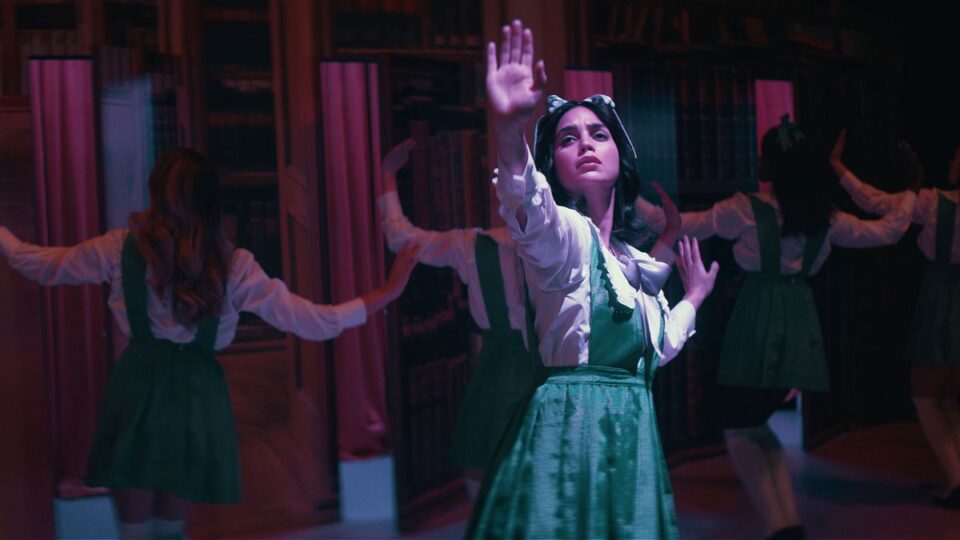
DC: You’ve worked a lot with fellow composer Tyler Bates. How did you link up with Tyler, and what do you enjoy about collaborating with him?
TW: We’re actually working on two projects right now as we speak. So, I met Tyler when I first moved to L.A. It was, again, a very interesting Hollywood story. I was at the bottom of my driveway, I looked over, and it was my neighbor. We just moved into the house so I said, “Hey, neighbor!” We just started chatting, and I said, “What do you do?”
And he said, “Oh, I’m a composer.” Now, I had just moved from England, and normally, if you ask someone what they did in England, they’d say, “Oh, I’m an accountant,” right? Or a stockbroker or some really fairly sensible job, you know? So I was suddenly like, “I guess I really am in Hollywood because here’s my neighbor, and he’s a composer!”
And he’s like, “What do you do?” I’m like, “I’m a composer too!” So, the first film we ever worked on together was Slither for James Gunn. I orchestrated that, and Tyler did the score for that. So he was handing me drives over the fence, and I’d bring them into the studio here, and I would orchestrate, and then we ended up recording that.
And then the next film we did was 300. And then we did Watchmen and Sucker Punch, and all the while, Tyler mentored me and was basically like, “Do you want to take these cues? Do you want to write this? Do you want to write this?” So, by the time we got to Guardians of the Galaxy, I was writing a fair amount to help him out.
So it was wonderful when we got to do Pearl. He was like, “Why don’t we co-score this?” And same with Agent Elvis, which is a really funny rock and roll Netflix-Sony animated series we did with Matthew McConaughey as Elvis. Which, if you want something really out there, it’s a very, very funny animated show about Elvis, who thinks he’s a secret agent.
But yeah, we’ve worked together, dare I say, 20 years now. It’s been a long, long time. Tyler was basically the first composer in film who took me under his wing. It was great. That’s one of the things that I really enjoy about living in Hollywood is there’s this incredible community here of people.
I love collaborating. I just finished doing Echo for Marvel, where I was orchestrating for Dave Porter, who did Breaking Bad and Better Call Saul. Yeah. Same with Rob Duncan. I orchestrated for him, and he did The Night Agent series and Castle.
There’s something about working with other composers, apart from the camaraderie, but you learn so much from seeing how other composers tackle the same job. Like, what’s their approach to a scene, you know? And when you’re orchestrating stuff like that, you can get into the DNA of the project a bit and really see a different approach being used or ideas that you can’t help but learn. These are incredible composers that you can just watch doing their craft. I can sit there and pick up ideas.
The next film I’m doing is a film called Somewhere in Dreamland for Ley Line, who did Everything Everywhere All At Once. It’s a horror film directed by Colin Tilley, who’s really well known as a music video director.
He’s done some of the most incredible music videos; this is his first feature. And again, working with Dave Porter on Echo, he had this amazing synth, and I kept going, “What is that sound? What is that? I love that sound.” And he said, “Oh, it’s a C15 nonlinear synthesizer.” So, of course, I rushed out and got one. [Points to synthesizer sitting next to him off to the side] And my pitch to Somewhere in Dreamland was, “Hey, I’m going to score the entire thing with this C15 nonlinear. It’s this crazy synth. It’s totally out there, and it’s going to be amazing.” Anyway, it really is a very cool machine. I’m using vocals with it and the film is really trippy. It’s like a fever dream. It’s about this creature called the Sandman who comes and basically haunts your dreams. In a bad way.
DC: Kind of like a modern Freddy Krueger?
TW: [Laughs] Except in this, he’s more karmic. It’s really people who bullied others who get his vengeance. It’s a really cool film. I don’t want to say too much about it to avoid spoilers, but it was working with Dave that immediately turned me on to this amazing synthesizer that was unlike anything I’ve ever heard. It’s just come out, just been invented as a game-changing synth. So, literally, the next project I’m working on, I’m digging into this thing and working with it.
That’s one of the things that’s really cool about Hollywood is getting that opportunity to work with these incredible composers in different capacitieis. Same with The Boogeyman. I got to orchestrate and conduct that with Patrick Jonsson. Then again with Ben Wallfisch. I’ve gotten to conduct so many of Ben’s incredible scores — It, It Chapter Two, Annabelle: Creation. Even just conducting that music and getting familiar with it informs my own composing. I don’t know of anywhere else in the world that has that level of community. You really can see the same scenes done in different ways and how different people approach it.
Your Monster is currently negotiating its international and domestic release rollout. In the meantime, you can learn more about Williams and hear more of his work by checking out his website, here.
Categorized:Interviews

